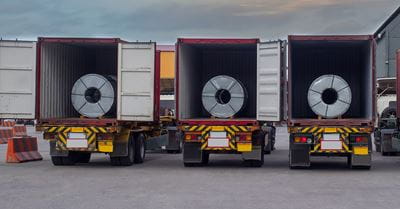18 Types Of Specialty Forks For Your Forklift

For some applications, specialized lift truck forks can make your job easier, safer and more efficient.
For most industries, forklift forks are pretty ordinary. Nobody gives them much thought beyond routine inspection and occasional replacement. However, just as there are unique forklift attachments for specific industries, there are also specialized forks. Here are some of the types of specialty forks available.
Stainless Steel Forks
Stainless steel clad forks are most often used in chemical, food processing, and pharmaceutical operations. These corrosion resistant forks are easy to clean and resistant to bacteria.
Spark Retardant Forks
Potentially explosive or flammable locations such as mines, chemical plants, grain elevators, munitions storage and other volatile applications require forks that will not generate sparks. These brass clad forks are designed to prevent sparking.
Anti-Slip Forks
Engineered for handling slippery plastic pallets, anti-slip forks have a rough, abrasive coating on the top of the fork blade. An alloy of hardened steel is applied to the fork, providing a jagged surface to grab the pallet. The extra grip helps loads remain safely on the forks while driving, reversing or stopping.
Quick Detach Forks
When necessary, quick detach (QD) forks can be swiftly and easily removed from a forklift's carriage. An upper hook makes it possible to remove the fork without first removing the carriage/fork holding bar. This rapid interchangeability is a significant time and money saver.
Folding Forks
Folding forks are often used when operating in a confined work space, or for lift trucks that are trailered to various work sites. Folding forks fold at the heel on a pin, allowing the blade to be placed in an upright position and secured with a chain.
Rotator Forks
Rotator forks are attached to a rotator attachment which can invert the forks. Usually the forks fit into pockets in a bin that needs to be tilted or inverted to empty the contents.
Inverted Forks
Inverted Forks are permanently mounted in an “upside down” position. They are generally used for lifting bags or sacks that have loops or entry points on the top of the product. Inverted forks actually extend the overall lifting height versus standard mount forks on the same mast.
Bolt On Forks
Bolt-on forks are attached to the carriage with bolts instead of hooks or a tube. This mounting option significantly attenuates any movement of the forks when the forklift is in motion or is loading / unloading.
Concrete Block Forks
Block forks are used for lifting large quantities of concrete blocks. They can be ordered in sets as needed, based on the weight, load-width, and configuration.
Coil Forks
Radiused coil forks are used to move cable reels, steel coils, or other similarly shaped loads like concrete pipes. The forks straddle the payload and cradle it as it is moved from one place to another.
Tire Forks
Tire chamfered forks are used for lifting tires of all sizes. These forks that have the top inside corners specially chamfered to handle tires. This chamfer allows the forks to easily slide underneath the tire.
Corrugated Forks
Corrugated Forks are mainly used to slide underneath and to lift corrugated sheets that are sitting on the floor in situations where there is no skid or spacer separating the sheet from this surface.
Drum Forks
Drum forks can be used to lift one or two drums at once. While they are typically sized for standard 55 gallon drums, they can be manufactured to fit other sizes as well.
Offset / Inset Forks
Offset forks are engineered to allow the forks on the forklift to be wider than the carriage. Whenever offset forks are used, however, the load capacity of the truck needs to be re-evaluated.
Inset forks are just the opposite–they are set up so that the forks are narrower than the carriage. These forks generally fit around a vertical center support bar on the carriage.
PAB Forks
Peek-a-Boo (PAB) forks are designed to increase the visibility of the forklift operator. Generally used in the lumber industry, these types of forks are wide and less than 2 inches thick. A reduction in shank width is possible because the stress exerted on the fork while lifting diminishes as one progresses towards the top of the shank.
Gypsum Forks
Used primarily for wallboard, gypsum forks are specially engineered with product preservation in mind. They are designed with a double sided bevel at the tip for easy entry between the sheets of wallboard, a high back for support, and the blade is polished to remove sharp corners and prevent damage to drywall products.
Tin Plate Forks
Used to load can forming machines, tin plate forks have tapered, offset tips to allow easier access into small skids. A removable neoprene or polyurethane backing is used to protect the steel sheets from indentations, which can cause forming machines to jam.
Boat Forks
Used in marinas and boatyards, boat forks are designed for lifting and lowering boats. The blades on this style of fork are covered in 1/2" rubber for added load protection.
Forklift Forks Near Me
If you are in the market for specialty lift truck forks, or even standard forks, extensions or attachments, talk to a lift truck expert at Raymond West today! We can assist with finding the right forks for your truck and help keep your operation safe and productive.

